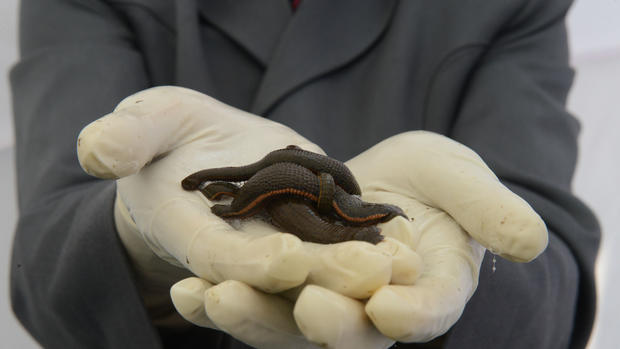Tasmanian devil milk may help fight superbugs
The global battle against deadly superbugs may be getting some help from an unlikely source: milk from Tasmanian devils.
Australian researchers have found that the marsupial’s milk contains peptides that can fight hard-to-kill bacteria and fungi that can result in deadly infections. The animals – carnivores native to the Australian island of Tasmania – are born at a very early stage of development and spend the first few months of their lives in their mother’s pouch, which helps shape their immune system.
For the study, published in the Nature journal Scientific Reports, the scientists studied the Tasmanian devil’s genome and identified six peptides with these superbug-killing qualities. These compounds are thought to have evolved to protect the animal’s young during early life.
The researchers were then able to artificially replicate the peptides and test their effectiveness at killing harmful bacteria in the lab.
Among the drug-resistant microbes that the animal’s peptides killed was methicillin-resistant Staphylococcus aureus (MRSA). About 1 in 3 people carry MRSA in their noses and most of the time it’s relatively harmless – but it can become deadly if it enters the bloodstream.
The peptides also killed the strain of the pathogen Enterococcus faecalis that is resistant to vancomycin, one of the world’s most powerful antibiotics.
The researchers say their findings could help in the development of new drugs to aid in the fight against these superbugs.
Experts have long warned that as bacteria develop resistance to our arsenal of drugs, we are edging closer to a post-antibiotic era where once simple infections will no longer be treatable. They emphasize the need to act fast to develop new antibiotics and work to prevent antibiotic resistance.
“We need to do this hunting in unusual places for new antibiotics. People are beginning to explore and find new molecules,” Dr. Richard Stabler of the London School of Hygiene & Tropical Medicine told the BBC.
In September of this year, the United Nations pledged a global effort to tackle the growing problem of drug-resistant superbugs.
“Antimicrobial resistance poses a fundamental threat to human health, development, and security… We are running out of time,” said Dr. Margaret Chan, Director-General of the U.N.’s World Health Organization.
A report published earlier this year estimates that by the year 2050, superbug infections could kill 10 million people a year worldwide – an average of one death every three seconds – if urgent action is not taken to address the problem.

